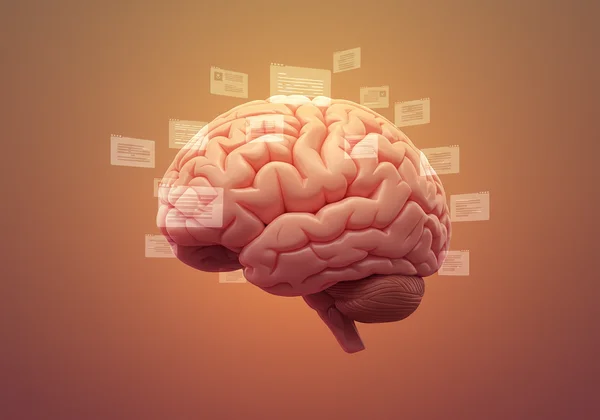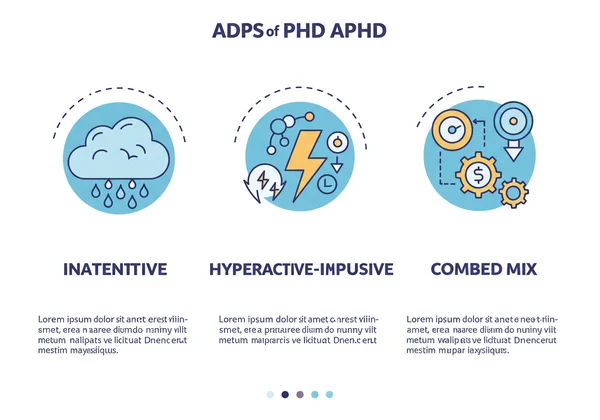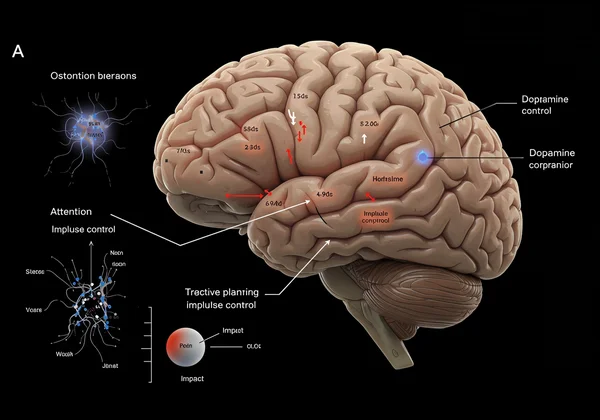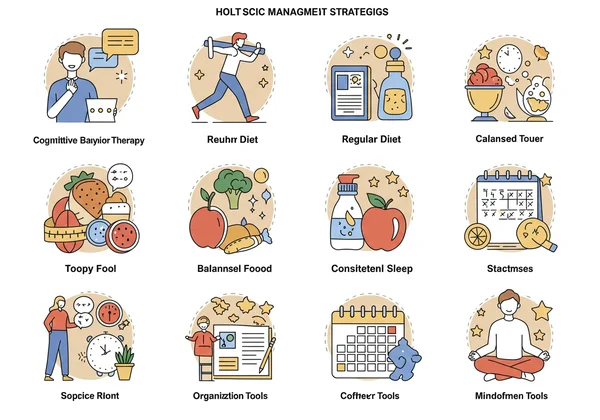What is ADHD? Your Guide to Symptoms, Types, & Diagnosis
October 8, 2025 | By Julian Navarro
Have you ever felt like your brain has too many tabs open at once? Do you struggle with forgotten appointments, unfinished projects, and a constant feeling of being overwhelmed? If you're asking yourself how to know if you have adhd quiz results might offer a clue, you've come to the right place. Understanding ADHD is the first empowering step toward clarity and control. This guide will walk you through what ADHD is, its various symptoms and types, and how it is professionally diagnosed.
ADHD, or Attention-Deficit/Hyperactivity Disorder, is one of the most common neurodevelopmental conditions, affecting millions of children and adults worldwide. It’s not about being lazy or undisciplined; it’s about having a brain that’s wired differently. For those who wonder if their daily struggles are more than just personality quirks, a preliminary exploration can be incredibly validating. A great place to start is with an initial self-assessment. To gain some personal insight, you can start your ADHD quiz on our homepage.

Understanding ADHD: Core Concepts & What it Means
To truly grasp ADHD, we must move beyond stereotypes and look at the science. It is a complex condition that impacts the brain's executive functions—the set of mental skills that include working memory, flexible thinking, and self-control. These functions are crucial for planning, focusing, and juggling multiple tasks.
Defining ADHD: More Than Just "Lack of Focus"
At its core, ADHD is a chronic condition marked by persistent patterns of inattention, hyperactivity, and impulsivity that interfere with daily functioning and development. It originates in childhood and often continues into adulthood. It's essential to understand that this is a biological condition related to brain structure and chemistry, particularly the neurotransmitter dopamine. This is not a character flaw, a moral failing, or a result of poor parenting.
Common Misconceptions: About ADHD
Many myths surround ADHD, creating stigma and misunderstanding. A common one is that it's a childhood disorder that people "grow out of," but for many, symptoms persist and evolve through life. Another is that only hyperactive boys have it, which ignores the millions of girls, women, and adults with the inattentive presentation. By debunking these myths, we can foster a more supportive and accurate understanding of the condition.
The Many Faces of ADHD: Symptoms and Types
ADHD isn't a one-size-fits-all condition. It manifests differently from person to person, which is why it's categorized into three main presentations or "types." Recognizing these distinctions is key to understanding your own experiences or those of a loved one.
Inattentive Presentation: "ADHD-PI" (Predominantly Inattentive)
Often historically referred to as ADD, this type is characterized by significant difficulty with focus and organization. Individuals may seem like they are daydreaming or "in their own world."
Key symptoms include:
- Making careless mistakes at school or work.
- Struggling to sustain attention during tasks or conversations.
- Appearing not to listen when spoken to directly.
- Difficulty following through on instructions and finishing projects.
- Being chronically disorganized and losing things frequently.
- Avoiding tasks that require sustained mental effort.
This presentation is often missed, especially in girls and women, as the symptoms are less disruptive than hyperactivity. If these signs feel familiar, an adhd in women quiz can offer a helpful starting point.
Hyperactive-Impulsive Presentation: The Classic Picture
This is the presentation most people associate with ADHD. It involves a near-constant need for movement and a tendency to act without thinking through the consequences.
Key symptoms include:
- Fidgeting with hands or feet, or squirming in their seat.
- Feeling restless or unable to stay seated.
- Running or climbing in inappropriate situations.
- Talking excessively and often loudly.
- Blurting out answers before questions are completed.
- Interrupting others' conversations or activities.
In adults, overt hyperactivity may lessen into a feeling of internal restlessness or an inability to relax.
Combined Presentation: When Symptoms Overlap
An individual with a combined presentation meets the criteria for both inattentive and hyperactive-impulsive symptoms. This is the most common form of ADHD. They experience a mix of challenges related to focus, organization, restlessness, and self-control, impacting multiple areas of their life.

ADHD Symptoms Across the Lifespan: Children, Teens, and Adults
ADHD symptoms can change with age. A child who runs around the classroom may grow into a teen who can't stop tapping their foot, and then into an adult who changes jobs frequently out of boredom. For parents observing these traits, a tailored adhd quiz for kids can provide initial direction. For adults reflecting on a lifetime of challenges, an adult adhd quiz can be the first step toward understanding.
What Causes ADHD & How it's Diagnosed
Understanding the "why" and "how" of ADHD is crucial for demystifying the condition and navigating the path to getting help. It is not caused by too much sugar or bad parenting; its roots are primarily biological.
The Science Behind ADHD: Genetics & Brain Function
Research strongly indicates that ADHD is largely genetic. If a parent has ADHD, their child has a significantly higher chance of having it too. Scientists have also identified differences in the brain structure and function of individuals with ADHD, particularly in areas responsible for attention, planning, and impulse control. It is a real, brain-based medical condition.

The Diagnostic Journey: What to Expect
A formal ADHD diagnosis can only be made by a qualified healthcare professional, such as a psychiatrist, psychologist, or neurologist. The process is comprehensive and typically involves:
- A detailed clinical interview about personal and family medical history.
- Reviewing developmental history and patterns of behavior.
- Using standardized rating scales and symptom checklists.
- Ruling out other conditions that could cause similar symptoms.
It is critical to remember that online tools are designed for screening and informational purposes only. They can provide valuable initial insights and help you decide whether to seek a professional opinion. An online ADHD quiz is a fantastic, confidential first step to gather your thoughts before speaking with a doctor.
Living with ADHD: Management and Support
Receiving a diagnosis is not an end point; it's the beginning of a new chapter of understanding and self-management. While ADHD presents challenges, many individuals learn to leverage their unique strengths, like creativity and high energy, to thrive.
Holistic Approaches: to Managing ADHD
Effective ADHD management often involves a multi-faceted approach. This can include non-pharmacological strategies like Cognitive Behavioral Therapy (CBT) to reframe negative thought patterns and build coping skills. Lifestyle adjustments such as regular exercise, a balanced diet, and consistent sleep can also have a profound impact. Many people with ADHD benefit from using organizational tools, time management techniques like the Pomodoro method, and mindfulness practices.

When to Seek Professional Guidance
If the symptoms described in this guide resonate deeply and are negatively impacting your work, relationships, or overall well-being, it is time to seek professional guidance. Self-assessment is a valuable tool for reflection, but it cannot replace a formal evaluation. Use the insights you gain from an adhd self-assessment quiz to start a productive conversation with a healthcare provider.
Taking the First Step: Clarity and Support for Your ADHD Journey
Understanding ADHD is about recognizing that your brain works differently, not deficiently. It's a journey of self-discovery, learning to work with your unique wiring instead of against it. From its complex symptoms to its various presentations across the lifespan, ADHD is a real and manageable condition. Support, strategies, and effective treatments are available.
If you see yourself or someone you love in these descriptions, don't stay in a state of confusion. Taking the first step is the most powerful thing you can do. We encourage you to take our free, confidential, and scientifically-based ADHD quiz for initial insights. It is a responsible starting point that can empower you with the clarity needed to plan your next steps.
Take the free ADHD quiz now and begin your path toward understanding.
Frequently Asked Questions About ADHD
How do I know if I have ADHD?
The only way to know for sure is through a comprehensive evaluation by a qualified healthcare professional. However, if you consistently experience symptoms of inattention, hyperactivity, or impulsivity that disrupt your life, it's a sign worth exploring. Self-assessment tools like the free adhd quiz can provide a preliminary check and help you organize your concerns before seeking a professional opinion.
What are the main types of ADHD?
There are three main presentations of ADHD. The Predominantly Inattentive Presentation involves challenges with focus, organization, and follow-through. The Predominantly Hyperactive-Impulsive Presentation is marked by restlessness, fidgeting, and acting without thinking. The Combined Presentation includes a mix of symptoms from both categories.
Can ADHD symptoms be confused with other conditions like anxiety or bipolar disorder?
Yes, absolutely. ADHD shares symptoms with several other conditions, including anxiety disorders, depression, bipolar disorder, and even autism. For instance, both anxiety and ADHD can cause restlessness and difficulty concentrating. This symptom overlap is why a professional differential diagnosis is essential to ensure you receive the correct and most effective support. An adhd or anxiety quiz may help you spot some differences, but it is not a substitute for a clinical evaluation.
What should I do if I suspect I have ADHD after reading this guide?
A great first step is to take a confidential online adhd test to get initial insights. Afterward, schedule an appointment with a healthcare professional, such as your primary care doctor or a mental health specialist, to discuss your concerns. Bring your quiz results and a list of specific examples of how symptoms affect your daily life.
Is an online ADHD quiz a reliable way to get diagnosed?
No. It is crucial to understand that online ADHD quizzes are valuable screening and informational tools, but they cannot provide a medical diagnosis. They are designed to help you identify potential symptoms and decide whether to pursue a formal, professional evaluation. Think of it as a well-informed first step on your journey to clarity.
Disclaimer: This article is for informational purposes only and does not constitute medical advice. The information provided is not a substitute for professional diagnosis or treatment. Always seek the advice of a qualified health provider with any questions you may have regarding a medical condition. The online ADHD quiz is a screening tool and not a diagnostic instrument.